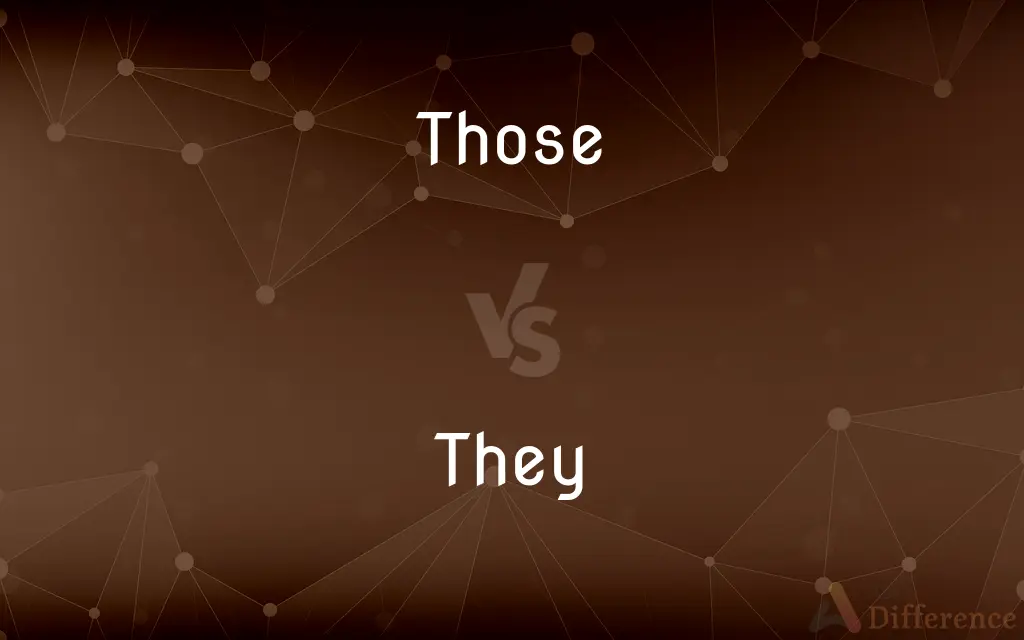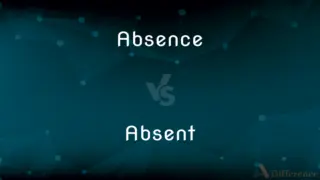Those vs. They — What's the Difference?
By Tayyaba Rehman — Updated on October 26, 2023
"Those" points to specific items or individuals at a distance, while "They" is used to refer to a group of people or things.

Difference Between Those and They
Table of Contents
ADVERTISEMENT
Key Differences
Those is used to point out specific items or individuals, particularly those at a distance. They, conversely, is a personal pronoun used to refer to a group of people or things.
Those often precedes a noun, specifying which objects or persons are being talked about. They, on the other hand, replaces the noun entirely, referring to the subjects previously mentioned or understood.
Those implies a physical or metaphorical distance or distinction from the speaker. They is neutral in terms of distance, focusing instead on the subjects themselves.
Those can also imply a sense of separation or difference, distinguishing certain items or people from others. They is inclusive, collectively referring to a group without implying distance or difference.
Those is used for both plural and singular nouns, depending on context. They traditionally refers to multiple entities but can also be used as a singular, gender-neutral pronoun.
ADVERTISEMENT
Comparison Chart
Pronoun Type
Demonstrative
Personal
Function
Points out specific things/people
Refers to a group of people/things
Distance
Implies distance or distinction
Neutral in terms of distance
Singular/Plural
Can be used for both
Traditionally plural, now also singular
Context
Follows nouns
Replaces nouns
Compare with Definitions
Those
Far objects
Those mountains are beautiful.
They
Multiple items
They are all ripe apples.
Those
Specific items
Can you move those boxes?
They
Non-specific persons
They say it's going to rain.
Those
Items in contrast
I prefer these cookies over those.
They
Unknown subject
They knocked on the door.
Those
Referring to past events
Those were the days.
They
Group of people
They are going to the party.
Those
People at a distance
Those students are talented.
They
Singular, gender-neutral
Someone left their bag; they can claim it later.
Those
Plural of that
Those bolts go with these parts.
They
In Modern English, they is a third-person pronoun.
Those
Plural of that
Those who serve [those persons who serve]
Don't touch those [those objects over there]
They
Used to refer to two or more people or things previously mentioned or easily identified
The two men could get life sentences if they are convicted
Those
The plural of that. See That.
They
Used to refer to a person of unspecified gender
Ask a friend if they could help
They
(the third-person plural nominative) A group of entities previously mentioned.
Fred and Jane? They just arrived.
Dogs may bark if they want to be fed.
Plants wilt if they are not watered.
I have a car and a truck, but they are both broken.
They
A single person, previously mentioned, but typically not if previously named and identified as male or female, especially if of unknown or (since 21st century) non-binary gender.
They requested a seat at Friday's performance but didn't say if they preferred the balcony or the floor.
If someone enters the restricted area, they are required to present identification.
They
(indefinite pronoun, vague meaning) People; some people; people in general; someone, excluding the speaker.
They say it’s a good place to live.
They didn’t have computers in the old days.
They should increase our wages.
Ha, you believe the moon is real? That's just what they want you to think.
They
There especially as an expletive subject of be.
They
The, those.
They
Their.
They
The plural of he, she, or it. They is never used adjectively, but always as a pronoun proper, and sometimes refers to persons without an antecedent expressed.
Jolif and glad they went unto here [their] restAnd casten hem [them] full early for to sail.
They of Italy salute you.
Blessed are they which do hunger and thirst after righteousness.
Common Curiosities
Is 'they' only plural?
Traditionally plural, but now also singular and gender-neutral.
Can 'those' refer to people?
Yes, 'those' can refer to a specific group of people.
Do 'those' and 'they' serve the same purpose?
No, 'those' is a demonstrative pronoun, while 'they' is a personal pronoun.
Can 'they' refer to objects?
Yes, 'they' can refer to a group of objects.
Can 'they' replace names?
Yes, 'they' can replace names of people or things.
Can 'they' refer to animals?
Yes, 'they' can refer to a group of animals.
Does 'those' imply a distance?
Yes, it often implies physical or metaphorical distance.
Is 'they' acceptable in formal writing?
Yes, 'they' is acceptable in both formal and informal writing.
Do 'those' and 'they' have the same formality?
Yes, both are used in formal and informal contexts.
Is 'those' used for singular nouns?
It can be, depending on the context.
Is 'those' used in comparisons?
Yes, it can be used to contrast items or people.
Can 'they' be used for unspecified gender?
Yes, 'they' is used as a gender-neutral pronoun.
Does 'those' require a noun after it?
Generally, yes, it often precedes a noun.
Can 'they' imply unknown subjects?
Yes, it can refer to unspecified or unknown subjects.
Can 'those' be used to refer to past events?
Yes, it can refer to past events or times.
Share Your Discovery

Previous Comparison
Absence vs. Absent
Next Comparison
Scanner vs. PrinterAuthor Spotlight
Written by
Tayyaba RehmanTayyaba Rehman is a distinguished writer, currently serving as a primary contributor to askdifference.com. As a researcher in semantics and etymology, Tayyaba's passion for the complexity of languages and their distinctions has found a perfect home on the platform. Tayyaba delves into the intricacies of language, distinguishing between commonly confused words and phrases, thereby providing clarity for readers worldwide.
















































